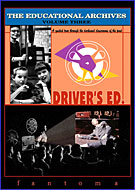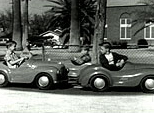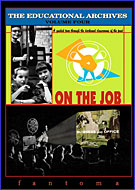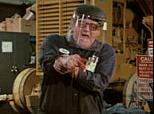| Release List | Reviews | Price Search | Shop | Newsletter | Forum | DVD Giveaways | Blu-Ray/ HD DVD | Advertise |
| Reviews & Columns |
|
Reviews DVD TV on DVD Blu-ray International DVDs Theatrical Reviews by Studio Video Games Features Collector Series DVDs Easter Egg Database Interviews DVD Talk TV DVD Talk Radio Feature Articles Columns Anime Talk DVD Savant HD Talk Horror DVDs Silent DVD
|
DVD Talk Forum |
|
|
| Resources |
|
DVD Price Search Customer Service #'s RCE Info Links |
|
Columns
|
 |
DRIVER'S ED. |

|
Driver's Ed. Fantoma 1954-80 / b&w & color / 1:33 flat full frame / 10 educational films DVD Menu and Package design Derrick Scocchera DVD curator Skip Elsheimer DVD Producers James Healey, Ian Hendrie, Derrick Scocchera |

Tomorrow's Drivers (1954, 11 min) Sponsored by "Your Chevrolet Dealer", this film is narrated by James Stewart and shows a program at a grade school in Arizona where children are taught road safety by tooling around in cool little pedal cars on roadways painted on their playground. They play roles of drivers and pedestrians and are issued tickets by student policemen, etc. Rather well done, it's especially fun to see the faces of these cute little pre-media savvy tykes caught unawares.
Joy Ride - An Auto Theft (1976, 12 min) Made by Barr Films, directed by William Crain. Using a Dragnet-like, "this actually happened" format, we follow two convincingly bored young teens who "borrow" a car to impress their equally naive and bored girl friends. Drifting about, they are eventually chased by the cops to a horrible end. This one must have been very effective with adults who would appreciate the contrast between the kids' natural bravado and their inexperience - the joy riders try to "wash" the cracks out of a broken windshield, and when they're alone with their hot dates in an abandoned wreck, they touchingly play "car" like tots. Kids watching the film probably identified with the thrills and not the moral - it's too easy to assign responsibility for the crash to the cops' pursuit. It's an update of the old "bad kids die" theme, but with a gentler attitude toward its realistic teens.
Alco Beat (1965, 11 min) Cahill and Associates. This one succeeds by being openly funny. A handful of volunteers test themselves on a driving course to measure reflexes and reaction time, and then take it again after consuming enough liquor to become legally drunk. When the previously "normal" people are packed back into their cars, staggering about with goony smiles on their faces, this must have gotten a lot of laughs. They're attended by automaton-like Highway Patrolmen, and doctors who measure their blood alcohol, etc. Since the message gets across at nobody's expense, this comes off as an excellent show.
The Bottle & the Throttle (1961, 10 min) Sid Davis. A teen who had a few beers with his pals runs over a lady and her child and has to deal with the consequences of his act while reliving the events leading up to the event. The Blame Game is important here, even though the sad-sack driver could just as easily have killed the pedestrians if he was cold sober. Spends a lot of time explaining the physical effects of alcohol.
The Talking Car (1969, 16 min) Alfred Higgins. Some truly annoying cars talk via crude animation to give a child the lowdown on his bad habit of running into the street. Even back then, any kid old enough to not be freaked out by the talking car would have been insulted by the patronizing attitude. Higgins must have belonged to a car club because there's a steady procession of Mustang automobiles on view. The film might have been a serious audition item for young actor Brian Forster, who became a regular on the Partridge Family the next year.
The Last Prom (1980, 23 min) Multimedia Program Productions. Like some other popular titles, this grim show was remade more than once to update the cars and styles. With all the last-date foreshadowings of death and using a creepy choir to provide a background to the tragedy, this one could have been titled Doomed Teens. Like all films of this kind it probably impressed sensitive kids who wouldn't drive drunk anyway, while leaving potential hardcore offenders unmoved. But the crying need for some kind of intervention makes the film's usefulness obvious; who didn't attend a high school where that didn't suffer some kind of alcohol/drug car wreck tragedy? This particular "death school" is called Batesville High. 1
Safety Belt for Susie (1962, 11 min) Cahill and Associates. This is a classic. It was directed by Pat Shields, the man who taught Savant to edit TV commercials for Mattel. Written up in the book Incredibly Weird Films, this seat belt awareness short is about Susie and her life-sized doll companion. Susie's parents are driving alone with the doll when they have an accident which graphically demonstrates how Susie might have been killed in images of the doll flying to flinders inside the passenger compartment. This prompts a montage of UCLA's early high-speed photography studies with crash dummy research. A very clever way to avoid showing a mangled child directly, this show helped make Shields a hot television director before he got bogged down directing episodes of Lancelot Link, Secret Chimp.
I Like Bikes, But ... (1978, 14 min) General Motors. A rather endless epic with animated and real bikes that stresses the need to safely share the road with two-wheeled vehicles. Lisa grows up from being a hard-to-see kid on a bike, to taking driver safety classes herself.
Highball Highway (1963, 11 min) An athletic man drinks while driving. He wakes up in a hospital bed missing a leg and wondering if he killed his best friend, the safer driver. A heavy guilt trip with another large midsection covering alcohol facts, this print is missing its title but is probably from Cahill and Associates, as at least one shot is identical to one in Alco Beat. Actor Robert Young shows up for a heartfelt finishing statement. Gee, was Robert doing public service from some highway indiscretion?
The Crossroads Crash (1973, 10 min) National Safety Council. Intersection collisions illustrate bad driving habits. The graphic thrills are provided by test dummy car crashes. Timelapse photography and Gumby-level animation help out as well.

|
On the Job Fantoma 1948-80 / color & b&w / 1:33 flat / 12 educational films DVD Menu and Package design Derrick Scocchera DVD curator Skip Elsheimer DVD Producers James Healey, Ian Hendrie, Derrick Scocchera |
Some of the On the Job films are more in line with the earlier Social Engineering 101 educational films in that they are use notions of psychology in an attempt to mold work behaviors. I've never personally had the humiliating experience of being trained for a job by having a film stuck in my face, but it must be common practice these days. I can't help but think that workers plagued with showings of more than one or two of these would quickly develop very dark thoughts about attempted brainwashing. But the films are not all insulting - the industrial safety films in particular. There's a nice mix of vintage titles here, from the 40's to the 70's.
Promotion By-Pass (1958, 8 min) McGraw-Hill & Calvin Company. This is one of a series of middle-management workshop films that present situations without immediate solutions, to then be discussed in groups after the projector is turned off. A manager agonizes over a promotion that he bases on merit instead of seniority and then presents his decision to the loser, expecting him to accept it. After defensively giving 50 reasons why the guy should get the job, the boss is shocked when his polite bad-news pitch is answered by a polite, "I quit." Antiquated as a film, the lesson here hasn't aged a day - openness with employees is much better than haranguing them with lots of rationalizations for tough decsions. It's very disturbing when one realizes that the film's probable purpose was to help jerk managers like the one pictured short-change their older workers.
Down & Out! (1971, 9 min) National Safety Council. This rather annoying short shows a hapless worker suffering an average 3 hazardous falls per minute, slipping, tripping, flubbing and bumping into everything in his environment. Underscoring the fact that bad falls create needless bad injuries, the film invites either derisive laughter at the guy's suffering, or bland indifference ... It's not all that well made either, considering how much exposure it got.
Barbers and Beauticians (1960, 13 min) Apparently one of a series, this "Americans at Work" snoozer from the AFL-CIO klunkily lauds the work of, who else, barbers and beauticians, with a lot of stiff actors carving away crew cuts and tossing unusually unattractive hairstyles. It's stultifying. It's best use nowadays would be as a short subject with the Coen's The Man Who Wasn't There.
You & Your Work (1948, 10 min) Coronet. "Jack Taylor" is a miserable shoe clerk who goes to counselling to straighten out his attitude. A few minutes later, after being assured that the problem is his and not his employers, he's convinced that selling shoes is a noble profession. Jack is treated as a dolt who doesn't understand beans about anything. The answer to his problem is not to learn a decent trade or to educate himself for a meaningful job. Instead, Jack becomes a happy zombie, apparently selling shoes for the rest of his life.
The Trouble with Women (1959, 6 min) McGraw HIll & Calvin Company. Perfect title, huh? Unfortunately, this one's about a dumb manager who does a lousy job training women because he's prejudiced against them - they won't suffer his arbitrary orders as stoically as the men do, they quit to get married without warning, etc. So the attitude being criticized is the male manager's - the final title card asks us to guess what his problem is. Although this probably wasn't shown to the workforce at large, if it were it would have received gales of applause from approving female employees.
When You Grow Up (1973, 11 min) FilmsWest Inc. This rather dreary entry patiently explains to kids the fact that they won't be children forever, introducing the concept of work while offering a rundown of workaday jobs and professions out in the adult world. A sort of primer on the economy (producing goods, offering services), the film explains everything very slowly. Lots of miserable laborers are shown, with the admonition that they work because they like to, or so they can buy nice things - instead of admitting that they're stuck on a survival treadmill. Meant to inspire kids to think about their futures, the show doesn't put enough emphasis on education or give any indication that Life might be more than a paycheck. It's what you'd show to kids you want to steer toward trade school instead of a University ... and this one's aimed at 6 year-olds.
The Grapevine (1958, 7 min) McGraw HIll & Calvin Company. A companion film to The Trouble With Women, this mini-epic stresses the harm that can done by rumors & loose talk on the job. The manager has to deal with lots of ditzy "girls" who jump to conclusions and foment discontent over nothing. The inference is that office workers have no right to be interested in "things that are none of their business," while we see them systematically kept in the dark about issues that vitally affect their job. The film behaves as if rumor-mongering is the source villain, when it is probably just a symptom in workplaces where people are fired, laid off and transferred without notice, all in an atmosphere of secrecy and distrust.

Shake Hands with Danger (1980, 23 min) The Caterpillar Corporation. This is the most challenging and edgy film in the stack, a scary examination of how carelessness and ignoring safety rules with large industrial machines can maim and kill. It's quite honest in admitting that Caterpillar products get old and need repair. The good acting and direction also stress that workers sometimes arrive at their jobs hung-over or with preoccupied minds. A catchy country title song becomes a litany of mayhem. The singer doubles as a no-nonsense narrator as men come close to being crushed, mangled and dismembered. The errors and problems are related to personalities and human nature - a foreman who hustles a repairman into making a bad decision; a cranky old worker who allows a younger man to burn himself on a hot anvil when just a word would have spared him. On the Job doesn't have any of the infamous "eye" trauma or real-life mangled body scenes we've heard about (and Driver's Ed. doesn't include highway gore films, either), but this one comes closest. It's handled with skill and good taste while always making us cringe at the thought of what could happen to these real-looking guys ... and does happen, a couple of times.
How to Keep a Job (1949, 12 min) Coronet. Ed Blakeslee applies for a new job but acts like a total jerk at his interview, complaining about his old employers and hiding the fact that he was laid off. The interviewer decides to set Ed straight with an "example" story that compares a "gallant" employee with a "goofus" one. The solution to Ed's problems is (surprise) to realign his thinking to what his bosses want. The psychology of this approach is that the employees are always ungrateful asses, while the bosses are sympathetic, thoughtful and patient, and only make up inane lies in sincere efforts to communicate with dense workers.
Purely Coincidental (1970, 19 min) Another very effective, chilling tale, told in an elliptical way that insures interest and lets the message tell itself. Two men work in different food service factories, one for humans and one for pets. When machines break down at both places, expedience takes precedence over common sense. A batch of children's food is tainted while metal shavings spill into a shipment of dog food. Later, the dog food worker's child falls ill while the human food supervisors' retriever dies horribly from the spiked doggie chow. When both men meet over a beer, they curse "those irresponsible bastards" ... and the show ends as neatly as a classic short story. Trim, intelligent and totally free of verbal comment or moralizing, this one is a keeper.
Hidden Grievance (1959, 7 min) McGraw Hill & the Calvin Company graduate to color to tell this story of a complaining employee who, no matter how hard his supervisor coddles him, goes to the Union to raise havoc. There's not much to this one but it must have been a good discussion tool. The same scenario still repeats everywhere where employees take unfair advantage of Union contracts. For some reason they've given the griping worker a thick Canadian accent. *&%^# Canucks, anyway, right?
All Together (1970, 21 min) Vanguard Associates / Countrymen-Klang. Narrator Lou Rawls promotes work opportunities in the Navy with the sly inference that the racial discrimination found in the private sector is unknown in the armed services. That go-nowhere civilian job can't compete with hi-tech Navy training, but one black spokesman tells us he's the ship's barber. The usual service "see the world" jive is thrown in among Rawls' admonitions to ditch that dead-end job and join up. A female stenographer with an enormous afro is transformed into a black officer's secretary, with the unstated promise of racial and sexual equality. A soul handshake makes the Navy a righteous-looking place to be. All of which may be true for some disaffected young blacks, but Lou Rawls' soft-sell has predatory selective recruiting written all over it.
Although not as loaded with camp values as the first 2 volumes, Drivers' Ed. and On the Job inspire more interesting questions, about propaganda and mind control versus the legitimate need to curb dangerous behaviors or shake up workers about the risks they run. The Last Prom movies probably did save lives and Shake Hands with Danger is enough to make you think twice the next time you pick up a power tool. "They call me three-finger Joe," the song goes. I feel safer, and more cautious, already.
As usual, the workplace propaganda pictures now tend to negate their original intentions, but I'm told that the 2002 versions of these kinds of pictures are much harsher and oppressive. The best thing about On the Job, if you show it to kids, is that anybody with a brain will surely motivated to study harder in school.
Fantoma's discs of Driver's Ed. and On the Job are a collection of surviving prints of old movies that were never considered candidates for archival preservation: they're Ephemeral Films, a name that archivist Rick Prelinger (a contributor) coined. Therefore, many of them are just as faded or scratched as they were when we saw them in school, run ragged through 16mm projectors. Although none is in pristine condition, all are intact. Comparing their sometimes icky color and lo-fi sound to more adequately preserved films isn't at all fair. Once again, Fantoma deserves kudos for packaging these unique films so creatively.
On a scale of Excellent, Good, Fair, and Poor, the separate releases
Driver's Ed. & On the Job rate:
Short subjects: Excellent
Video: Excellent, it's the film prints transferred that vary from worn to really worn.
Sound: 16mm optical tracks, not exactly sonic perfection, admittedly.
Packaging: Keep case
Reviewed: June 23, 2002
Footnote:
1. A
great personal response from Kelly Perdue, 4.30.04: Dear Glenn,
Prepare yourself for possibly the most trivial/useless information you're
ever received regarding a review. Consider yourself warned. Was reading your
review of
Desk Set when I
noticed in the footnotes a reference to On The Job, a collection of educational
short subjects. One of the short subjects, The Last Prom, has some of your
comments:
"The Last Prom (1980, 23 min) Multimedia Program Productions. Like some
other popular titles, this grim show was remade more than once to update the
cars and styles..."
I'm actually in this film as one of the student "observers" of the death car
(please hold the applause, there's more). Back then I was in high school
and they gave some of us seniors the "privilege" of being extras outside the
school for the scene where a news reporter has the car and crowd in the
background. The honor did nothing to elevate our social standing, I'm
sorry to report, though the shoot was a big deal to us kids in our sleepy
little Indiana town in 1980. When it aired one afternoon on a local
independent station, a whole bunch of us gathered to watch a tape of it on
one of those monstrous new-fangled VHS machines.
"... Who didn't attend a high school where that didn't suffer some kind of
alcohol/drug car wreck tragedy? This particular "death school" is called
Batesville High."
Batesville High School, Batesville Indiana (nobody ever called it
"Batesville High"). The town is 'bout halfway between Indy and Cincinnati,
give-or-take. The entire film was made around the town; the crash scene was
supposed to be shot near an old stone railroad overpass a half-block from
my house but was cancelled at the last minute for safety reasons which didn't
please us young gawkers.
The town is also home to the Batesville Casket
Company, the country's premier casket manufacturer. I've seen Batesville
Casket Company trucks all over the country, including Los Angeles. I bring
this up for the obvious morbid connection.
One last point - our principal at the time was Glenn Butte, who had played
for our arch-rivals the neighboring Milan Indians in '54 when they
unexpectedly won the state high school basketball championship, which was
the true story on which Hoosiers was based. The final game was shot in
the Butler Fieldhouse in Indianapolis, the same place Glenn and hero Bobby
Plump energized the state a half-century ago.
Return
|
|
| Coming Soon |
|
|
| Special Offers |
|
|
| Columns |
| Home | Release List | Coupons | Shop | Reviews | Forum | Video Games | Price Search | Advertise |









